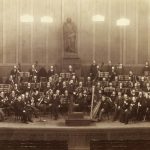Melinda Bargreen | 24 APR 2023
That resonant bass-baritone voice on the telephone could be no one else: it’s Wotan on the other end of the line.
Greer Grimsley, who has portrayed Wagner’s king of the gods in opera houses around the world since 2005, is now in rehearsals for the Atlanta Opera production of Das Rheingold—the first of the operas in Wagner’s four-part epic, The Ring of the Nibelung. It is no stretch to call Grimsley the definitive Wotan of our era, with his powerful bass-baritone voice, his theatrical presence, and his deep understanding of the Wagnerian epic.
Wagner’s “Ring” never loses its luster for Grimsley, who notes that every production offers a new view of the complex four-opera epic.
“I believe that’s what Wagner meant,” he says, “that every time it should be different, with a new point of view, exploring different aspects of the ‘Ring.’ It’s a joy and a real privilege to be a part of that.”
At the same time, it’s a whole lot of work, singing those enormous roles, and Grimsley concedes, “It can be daunting. I think a lot of audience members don’t realize that our voices are actually unamplified. Recently I was in San Francisco with Luretta [Bybee his wife, an operatic mezzo-soprano], and she told some operagoers, ‘You know, there are no microphones on the stage.’ Their faces were just astonished.
“People don’t realize that this is the unamplified voice, and that we are as present as any single member of the orchestra. This is an art form.”
The Atlanta Rheingold was in rehearsal at the time of this interview, and Grimsley joked that they were just about to begin the second scene: “I’m on my way to Nibelheim.” Director Tomer Zvulun is offering “fresh takes in a new production, and this can spark some new thinking about the characters. We all feed off each other’s input. We never approach the characters as ‘This is what I do’ or ‘This is the way I do it.’ Everyone is interested in moving forward.
“I think most performers look at it this way. I love being facile and supple in my thinking about a character, and finding something new. Tito Gobbi [the late opera baritone] sang at least 1,000 performances as Scarpia [the villain in “Tosca”], but in his book he said that he always found something new in the character. It was never ‘I always do it this way.’ That is a great lesson.”
Grimsley himself has evolved considerably over the years since his first Wotan.
“The first time I did it, about 60 percent of my thinking was about survival. It takes time to really invest in the character. It’s like taking a major hiking path for the first time, when you are just trying to get there. The second time, you remember the hairpin turns and dips. The third time, you know the path and can see the different species of trees, and you take it all in. The deeper you know the character, the more you gradually change over the years.”
Grimsley adds a new simile: “A great new role is like a lovely suit of clothes to begin with. But now it’s a familiar suit, one that feels almost like part of you.”
A born performer, Grimsley feels a palpable vibe from his audiences.
“You can’t quantify the energy that you feel from the audience, but musicians and actors feed on that energy. It’s what the Greeks were striving for in theater: catharsis. Our sound waves hit the audience, and there is a reaction.”
That reaction among listeners, Grimsley says, is different in an opera production than in a theater drama.
“A ‘straight play’ engages the analytical side of the brain. But when there is both music and text, both sides of the brain light up.”
The Atlanta Rheingold will fully engage audiences, Grimsley says, with a mythic representation of the story that explores the characters’ complex motivation.
“The costumes are beautiful,” Grimsley adds. “and so is the multimedia. With Tomer, you always know that he has the respect that this epic requires, and what the characters’ motivations are. This is not the kind of update where there are no Rhinemaidens! And with maestro [Arthur] Fagen in the pit, we will be in good hands. All the Ringheads will be there!”
Grimsley considers it a privilege to be there, too.
“For me, opera has been life-changing. After my first ‘Ring,’ I called up past voice teachers, coaches, and others who helped me get to that point. I felt such immense gratitude and support from my wife and daughter. For every singer, there are 50 or 100 people to thank right behind you: you don’t do it alone. I get to take the bow.” ■
EXTERNAL LINKS:
- Greer Grimsley: greergrimsley.com
- The Atlanta Opera: atlantaopera.org

Read more by Melinda Bargreen.







.png)